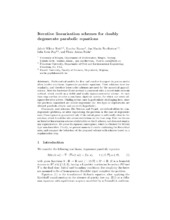Iterative Linearisation Schemes for Doubly Degenerate Parabolic Equations
Peer reviewed, Journal article
Accepted version

View/
Date
2019Metadata
Show full item recordCollections
Original version
Lecture Notes in Computational Science and Engineering. 2019;126:49-63 https://doi.org/10.1007/978-3-319-96415-7_3Abstract
Mathematical models for flow and reactive transport in porous media often involve non-linear, degenerate parabolic equations. Their solutions have low regularity, and therefore lower order schemes are used for the numerical approximation. Here the backward Euler method is combined with a mixed finite element method, which results in a stable and locally mass-conservative scheme. At each time step one has to solve a non-linear algebraic system, for which one needs adequate iterative solvers. Finding robust ones is particularly challenging here, since the problems considered are double degenerate (i.e. two type of degeneracies are allowed: parabolic-elliptic and parabolic-hyperbolic). Commonly used schemes, like Newton and Picard, are defined either for non-degenerate problems, or after regularising the problem in the case of degenerate ones. Convergence is guaranteed only if the initial guess is sufficiently close to the solution, which translates into severe restrictions on the time step. Here we discuss an iterative linearisation scheme which builds on the L-scheme, and does not employ any regularisation. We prove its rigorous convergence, which is obtained for Hölder type non-linearities. Finally, we present numerical results confirming the theoretical ones, and compare the behaviour of the proposed scheme with schemes based on a regularisation step.